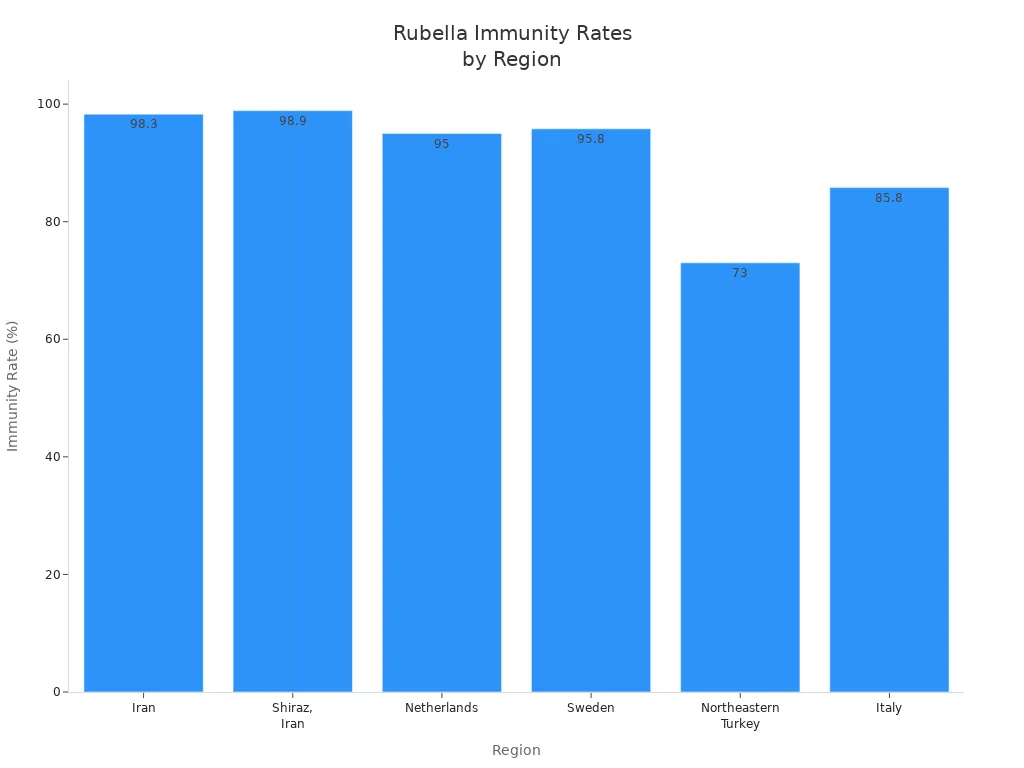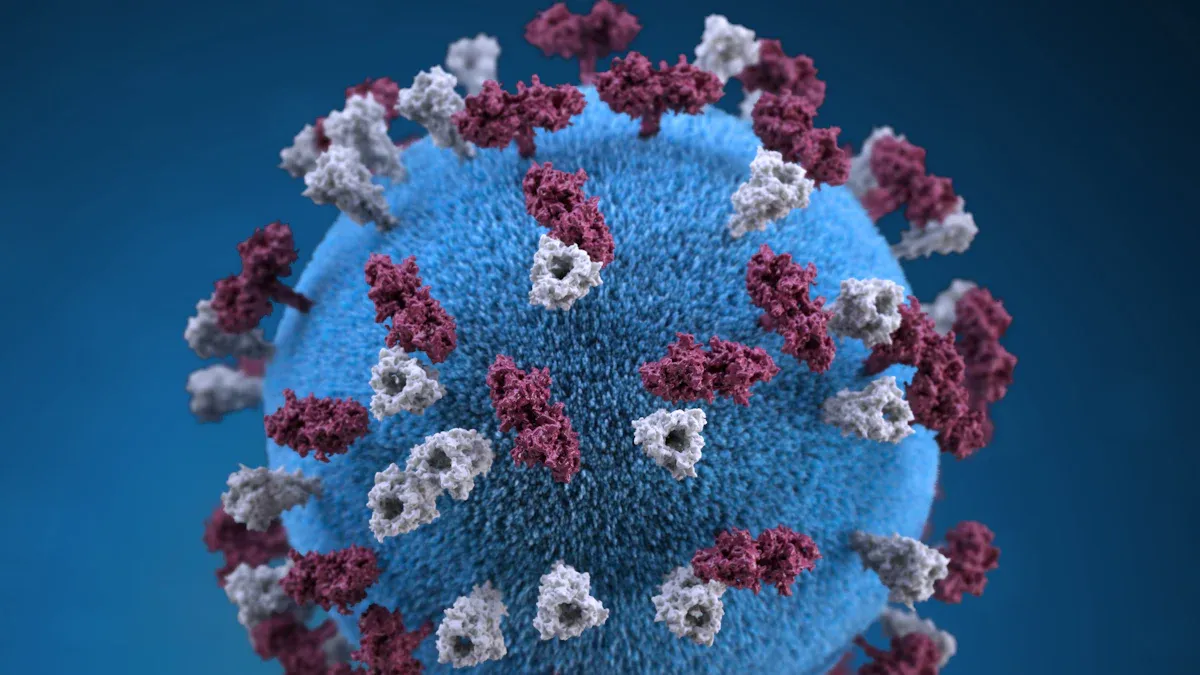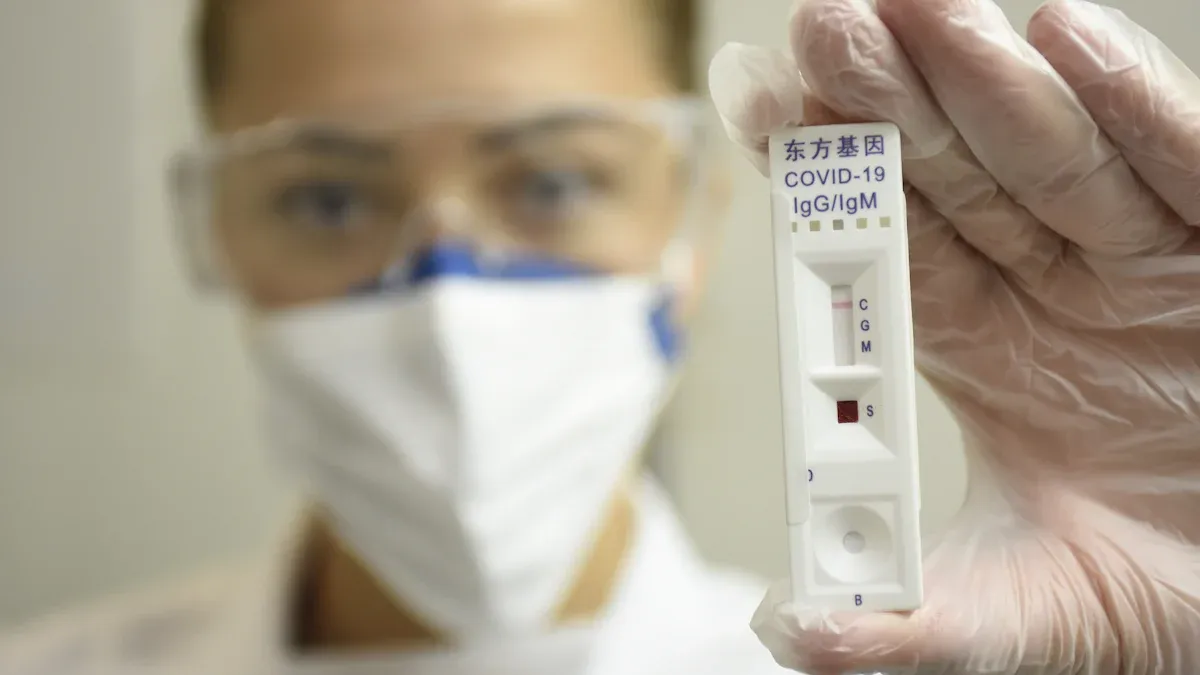Antibody knowledge
Understanding Rubella Virus IgG Ab for Immunity and Pregnancy

Rubella virus IgG Ab is a type of antibody your body makes after infection or vaccination. This antibody helps you build immunity to rubella, which protects you and your future baby from serious problems during pregnancy. Most women of childbearing age are immune, but about 9% remain at risk.
In Tunisia, only 6.8% of women are prone to rubella, showing that many have protection.

Knowing your immunity status can help prevent complications and guide your next steps. You may want to talk with your healthcare provider about screening, especially if you plan to become pregnant.
Key Takeaways
Rubella virus IgG Ab indicates immunity to rubella, protecting you and your future baby from serious pregnancy complications.
Routine rubella testing is crucial before and during pregnancy to assess immunity and prevent risks to the fetus.
If you lack immunity, vaccination before pregnancy is essential to avoid congenital rubella syndrome and other health issues.
A positive rubella IgG test means you are immune, while a negative test indicates a higher risk of infection during pregnancy.
Regular health checkups and vaccinations can significantly reduce the risk of rubella and its complications for mothers and babies.
Rubella Virus IgG Ab and Immunity

What Is Rubella Virus IgG Ab
You may wonder what rubella virus igg ab means for your health. This antibody is an immune protein your body creates after you get infected with rubella or receive the rubella vaccine. According to immunology textbooks and CDC guidelines, rubella virus igg ab is detected through rubella testing. These tests help diagnose rubella and confirm your immunity to rubella. When you have this antibody, your body can fight off the rubella virus if you encounter it again. Rubella testing uses blood samples to look for igg antibodies. If you plan to become pregnant, knowing your rubella virus igg ab status helps you assess immunity and avoid risks.
How Rubella Virus IgG Ab Shows Immunity
Rubella testing plays a key role in showing if you have immunity to rubella. You can see how results work in the table below:
Test Result | What It Means | Immunity Status |
|---|---|---|
You have rubella antibodies | Immune | |
IgG not detected (<10 IU/ml) | No rubella antibodies found | Not immune |
Positive test (≥1.0) | Rubella antibodies present | Immune |
If your rubella testing shows a positive igg result, you are considered immune to rubella. This means you have protection from future infection. The rubella vaccine helps most people develop long-term immunity. Studies show that the rubella part of the MMR vaccine is about 75% effective for at least 10 years. Antibody levels may drop a little over time, but most people stay above the immunity threshold. You may keep immunity for life after vaccination.
Tip: If you do not have rubella virus igg ab, ask your doctor about getting vaccinated before pregnancy. This step can help you avoid serious problems for you and your baby.
Rubella Test in Pregnancy

Why Pregnant Women Need Rubella Testing
You need to know your rubella immunity status before or early in pregnancy. Rubella testing helps you and your healthcare provider understand if you have protection against rubella. This is important because rubella infection during pregnancy can cause significant risks to fetuses, especially in the first trimester.
Routine prenatal screening for rubella virus igg ab is a standard part of antenatal care in many countries. Health organizations such as the CDC and WHO recommend that women establish immunity to rubella before pregnancy, either through vaccination or serologic testing. If you lack immunity, you should receive the MMR vaccine, but only before pregnancy. Pregnant women or those trying to conceive should not get live virus vaccines.
Many women still do not have immunity to rubella. Recent studies show that:
About 9% of pregnant women in the WHO European Region are susceptible to rubella infection during pregnancy.
In Saudi Arabia, 28.6% of pregnant women were unimmunized.
In Ethiopia, 11.4% of pregnant women had no IgM or IgG to rubella.
Note: Routine rubella testing during pregnancy helps identify women at risk and guides postpartum care for those who are not immune.
Interpreting Rubella IgG Results in Pregnancy
Rubella testing uses blood samples to check for rubella virus igg ab. The results help you and your doctor decide the next steps for your pregnancy and your baby’s health. You can see how to interpret the results in the table below:
Test Result | What It Means | Pregnancy Outcome Impact |
|---|---|---|
Positive rubella IgG test | You have protective antibodies from past infection or vaccination | You and your fetus are protected from rubella infection |
Negative rubella IgG test | No antibodies detected; you are not immune | You and your fetus are at risk for rubella infection |
A positive result means you have immunity to rubella. This protects you and your fetus from infection and its complications. A negative result means you do not have immunity. You face a higher risk if you come into contact with rubella during pregnancy. False-negative results can happen, but they do not harm immune individuals. If your test is negative, your doctor may recommend follow-up testing. False-positive results are rare but can give a false sense of security, so labs use tests with high specificity.
Tip: If you are not immune, your healthcare provider will discuss ways to protect you and your fetus. You should avoid contact with anyone who has rubella and inform your provider if you think you have been exposed.
Risks of Rubella During Pregnancy
Rubella infection during pregnancy can cause severe problems for your fetus. The risk is highest in the first trimester. If you get rubella early in pregnancy, your baby can develop congenital rubella syndrome. This syndrome can lead to:
Birth defects in over 80% of cases if infection happens in the first trimester
Damage to the central nervous system, such as microcephaly and cognitive disabilities
Hearing loss and vision problems, including cataracts
Heart defects and growth impairments
Late-onset issues like diabetes and thyroid dysfunction
Miscarriage or stillbirth in about 20% of cases
The virus can disrupt normal cell growth in the fetus, causing lifelong disabilities. Stillbirth and fetal death are more likely if you get rubella early in pregnancy. Symptoms of congenital rubella syndrome may appear at birth or develop later, sometimes up to four years after birth.
Countries without routine rubella vaccination report thousands of cases of congenital rubella syndrome each year. In 2019, 24,000 cases occurred in 19 countries without vaccination programs. Introducing rubella vaccination can prevent almost a million cases over 30 years.
Callout: If you are found to be non-immune during pregnancy, you cannot receive the MMR vaccine until after delivery. Your healthcare team will offer postpartum vaccination before you leave the hospital. This protects you and future pregnancies.
When and Who Should Get a Rubella Test
Screening Before Pregnancy
You should consider rubella testing before you try to get pregnant. This step helps you know if you have immunity and protects your future baby from serious health problems. Screening works best before pregnancy begins. If you find out you are not immune, you can get vaccinated and avoid risks. The risk of congenital rubella syndrome is highest if infection happens early in pregnancy. The table below shows how timing affects the risk:
Timing of Infection | Risk Description |
|---|---|
First 12 weeks | |
After 12 weeks | Risk decreases significantly |
After 20 weeks | Defects are rare |
Routine screening for rubella IgG antibody is part of preconception care in many countries. This helps doctors give you the right advice and care.
Testing After Exposure
If you think you have been near someone with rubella during pregnancy, you need rubella testing right away. You should call your doctor if you notice a rash or feel sick. The doctor will order a blood test to check for infection or immunity. Sometimes, antibodies show up 4–30 days after a rash appears. If your test shows you have immunity, you do not need more tests. If you do not have antibodies, your doctor will repeat rubella testing after four weeks. A positive result means you need a confirmation test.
Tip: Always tell your doctor about any possible exposure to rubella, especially in the first trimester.
High-Risk Groups
Some people have a higher chance of getting rubella. You may need rubella testing if you belong to one of these groups:
People with childbearing potential who have been in contact with a rubella case
Non-US-born Hispanic individuals, who made up 78% of rubella cases in 2000
Foreign-born workers in jobs like meat- and poultry-processing
Mexican-born workers, who have higher rates of infection than US-born workers
Asymptomatic infections can still cause problems, so doctors monitor you closely during pregnancy. Health policies recommend rubella testing for these groups to prevent the spread of the virus and protect babies from congenital rubella syndrome.
Understanding Rubella Test Results
Positive vs. Negative IgG
Rubella antibody tests help you understand your immunity status. When you get a positive rubella igg test, you have enough igg antibodies to protect you from rubella. This means you are immune, either from vaccination or a past infection. If your rubella antibody test shows a negative result, you do not have enough rubella antibodies. You are not immune and can get rubella if exposed. The table below shows the difference between positive and negative results:
Result Type | Immunity Status | Explanation |
|---|---|---|
Positive | Immune | Indicates sufficient rubella IgG antibodies, suggesting immunity due to vaccination or past infection. |
Negative | Nonimmune | Indicates rubella IgG antibody levels are below the immunity threshold, suggesting susceptibility to infection. |
You should know that rubella antibody tests are important during pregnancy. If you get a negative result, you need to avoid exposure and talk to your doctor about next steps.
Role of IgG Avidity and IgM
Rubella antibody tests can show the presence of igg antibodies, but sometimes you need more information. IgG avidity testing helps you and your doctor know if a rubella infection is recent or happened a long time ago. This test is very useful in pregnancy because recent infection can harm your baby. Low avidity means a recent infection, while high avidity means an older infection. The table below explains how avidity changes over time:
Aspect | Details |
|---|---|
Objective | To elucidate changes in rubella IgG avidity over time after acute infection. |
Study Design | Serial samples from 15 patients collected up to 4–5 months post-infection. |
Results | Avidity index increased steadily; low avidity (<40%) seen up to 6 weeks; high avidity (>60%) not observed until 13 weeks. |
Conclusion | Measurement of rubella IgG avidity is a good supplemental test for confirming or excluding recent rubella infection. |
Rubella IgM testing is also important. It helps diagnose acute rubella infection by showing specific antibodies linked to recent infections. If you have a positive rubella igg test and IgM, your doctor may use avidity testing to confirm if the infection is new or old.
IgG avidity testing helps differentiate between recent and past rubella infections.
It is especially useful in pregnancy due to the risk of congenital rubella syndrome.
It provides extra information when interpreting positive IgM results, which can sometimes be false positives.
Next Steps After Results
If your rubella antibody tests show a positive rubella igg test, you do not need further action. You have immunity and can feel safe during pregnancy. If your rubella antibody test is negative, you should avoid contact with anyone who has rubella. Your doctor may recommend repeat antibody testing after exposure, especially if you are pregnant. Sometimes, the presence of igg antibodies takes time to develop. Repeat testing helps confirm your immunity status.
Tip: Always follow your healthcare provider’s advice after rubella antibody tests. If you are not immune, ask about vaccination after pregnancy. This protects you and future babies.
You can protect yourself and your baby from serious health problems by understanding your immunity to rubella before pregnancy. Regular vaccination and health checkups play a key role in prevention.
The introduction of vaccination has reduced congenital rubella syndrome cases by 73% worldwide.
Most women who plan pregnancy should check their immunity status and stay up-to-date with vaccination.
If you find out you are not immune, contact a healthcare professional.
They may recommend two doses of the vaccine and waiting one month before trying to conceive.
This approach supports rubella prevention and keeps you and your future child safe.
FAQ
What does a positive rubella IgG test mean?
A positive rubella IgG test shows you have immunity. You either had the infection before or received the vaccine. You do not need further action if you are pregnant.
Can you get vaccinated for rubella during pregnancy?
You cannot get vaccinated for rubella while pregnant. Doctors recommend vaccination before pregnancy or after delivery to protect future pregnancies.
What should you do if your rubella IgG test is negative?
You should avoid contact with anyone who has rubella. Your doctor may suggest repeat testing. You can get vaccinated after pregnancy to protect yourself and your baby.
How often should you check your rubella immunity?
You should check your immunity before pregnancy or if you belong to a high-risk group. Routine screening helps prevent complications and keeps you informed.
Is rubella dangerous for your baby?
Rubella infection during pregnancy can cause birth defects, hearing loss, and heart problems. The risk is highest in the first trimester. Vaccination helps prevent these serious outcomes.

